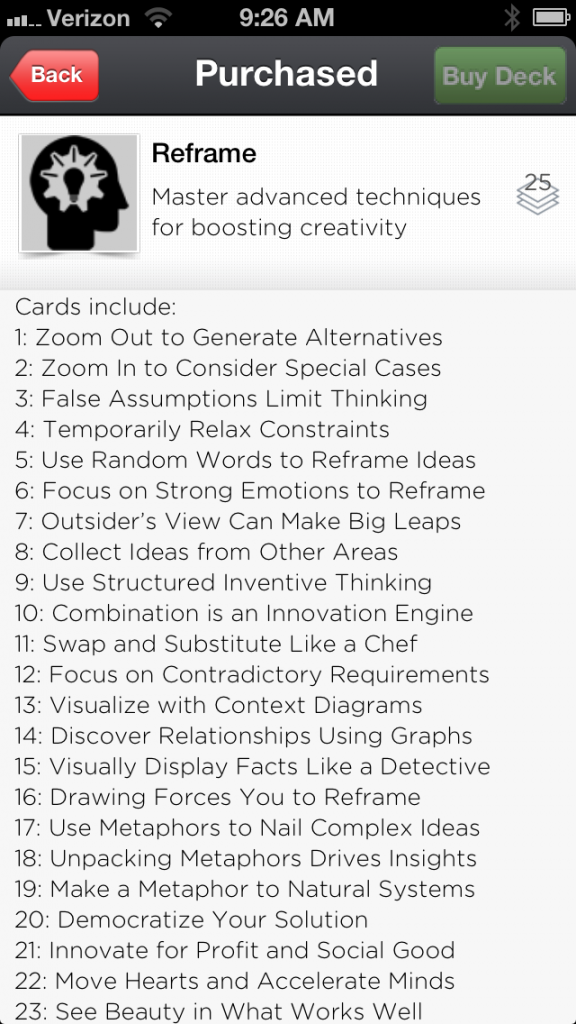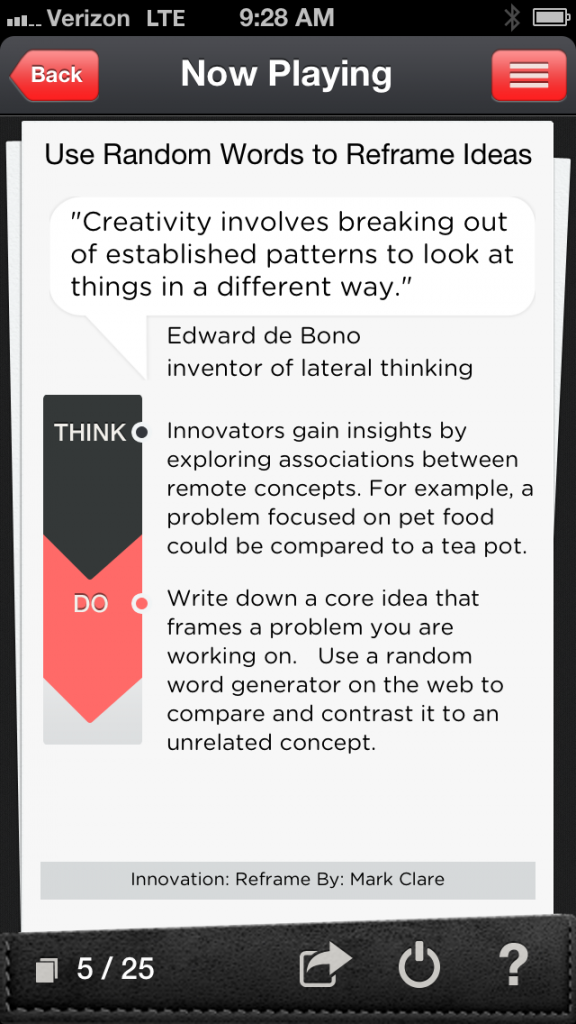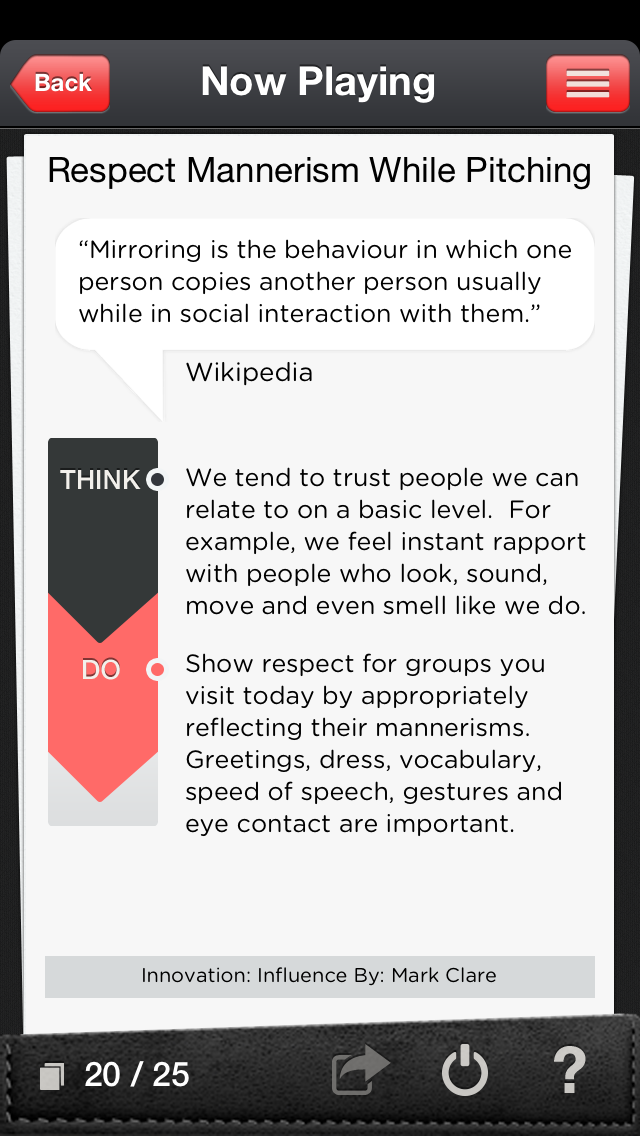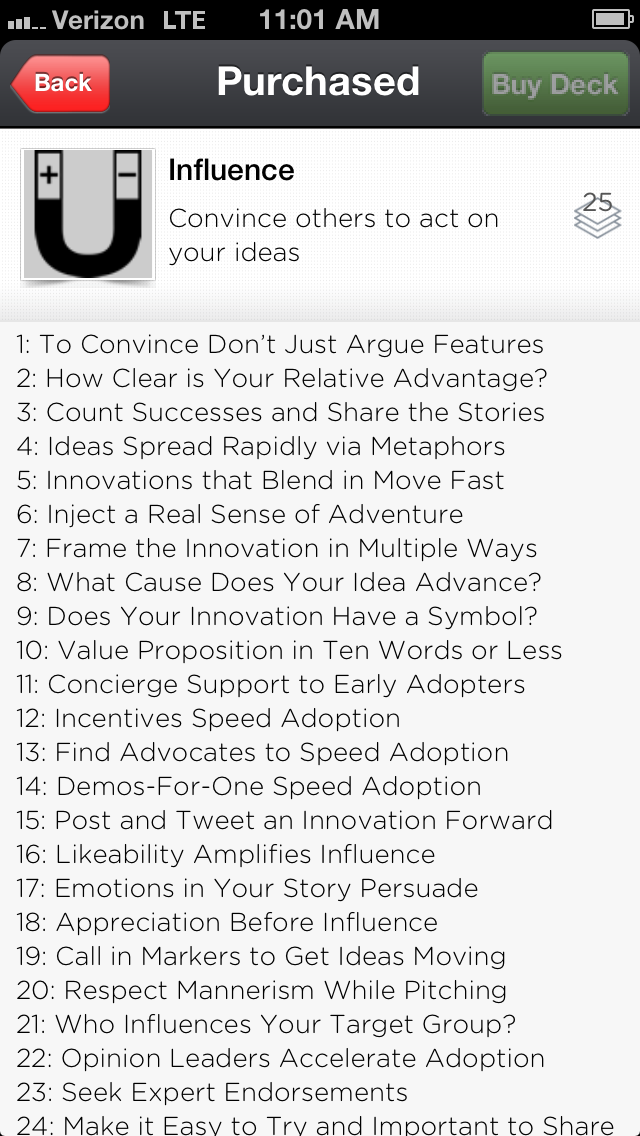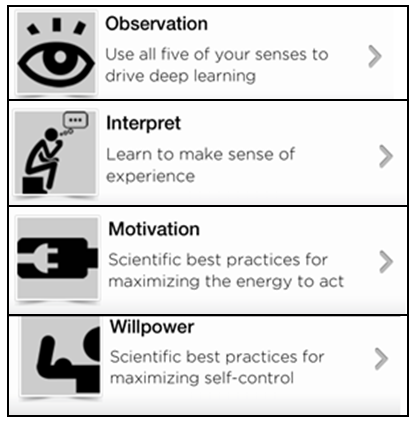A Placebo for Cognitive Enhancement?
In the Next Brain blog we report on research that suggests how we think about our own mental abilities has a significant impact on how well we perform. For example, in Perception of Age Impacts Cognitive Performance, we reported on a study that shows simply “thinking that you are old” will impact your score on a dementia test.
 Self-image, especially as it relates to what we believe we know, might be a powerful placebo for cognitive performance. More evidence comes from Your Thinking can Release Abilities Beyond Normal Limits, in The Scientific American. The article reviews an experiment that shows if you expect to know the answer to a question you tend to score better.
Self-image, especially as it relates to what we believe we know, might be a powerful placebo for cognitive performance. More evidence comes from Your Thinking can Release Abilities Beyond Normal Limits, in The Scientific American. The article reviews an experiment that shows if you expect to know the answer to a question you tend to score better.
Such results suggest (but by no means prove) that confidence, positive thinking, a growth mindset and affirmation could have a significant impact on memory, learning, creativity, visual acuity and a wide-range of cognitive performances.
This is a good news. It does not take too much effort to develop a positive affirmation about our mental abilities and then repeat it on a regular basis. For example, when struggling with a hard problem you could regularly repeat: “As I have in the past, I will see the answer to this problem”. You could even combine the affirmation with a ritual such as sitting in your creative chair or wearing your lucky shirt.
I am interested to hear from readers that have examples of placebos for cognitive performance.
Categories: Lifestyle, Mental Focus, Problem Solving Tags:
Assess Your Practical Creativity in 3 Minutes
Mind Tools has developed a 16-question creativity test you can complete in about 3 minutes. Not only does it give you an overall creativity score and rank, but you get a question by question analysis and suggestions for how to improve.
I have built some of the best techniques for improving creativity into NewHabits, a free iPhone and iPad app. Once you download the app, tap the store tab and check out Reframe, a deck of knowledge cards designed to help you master advanced creativity techniques.
There are a total of 25 cards. Play a card daily from your mobile device to experiment with and eventually master a proven creativity technique. Cards are designed to fit into everyday routines and take minutes to use. The Reframe cards work by converting general advice and complex how-to knowledge about creativity into right-sized chunks that are optimized for how we learn from experience.
A list of the Refram cards and an example are shown below.
Categories: Problem Solving, Software Tags:
Use Your Body to Boost Mental Performance
 Cognition is embodied. That is, how well you think and learn is in part controlled by how you use your body. We have covered many examples of how this works in the Next Brain Blog including stepping back for better emotional control, talking with your hands, thinking by walking around, posture effects (e.g. folding your arms) and short-duration physical activities interspersed with study.
Cognition is embodied. That is, how well you think and learn is in part controlled by how you use your body. We have covered many examples of how this works in the Next Brain Blog including stepping back for better emotional control, talking with your hands, thinking by walking around, posture effects (e.g. folding your arms) and short-duration physical activities interspersed with study.
See Use Your Body to Improve Thinking Instantly for more details.
Now the PsyBlog offers an excellent summary in 8 Easy Bodily Actions that Transform Mental Performance. These include for example, how using a deep voice can improve abstract thinking, a power stance can improve your sense of control, and just imaging yourself walking towards an important person or object can increase a sense of mastery.
Some of these are new to me and I am actively experimenting with them. Interested to hear from readers that have tried them out.
Categories: Lifestyle, Manage Emotions, Memory and Learning, Mental Focus, Problem Solving, Training Tags:
Innovators are Influencers
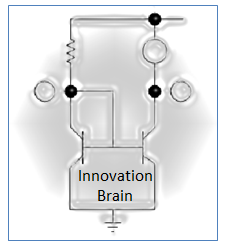 There is a lot of interest in getting better at innovation these days. While much of the focus is on creativity skill, a broader view indicates there are four areas you need to cultivate to build your innovation brain. These include:
There is a lot of interest in getting better at innovation these days. While much of the focus is on creativity skill, a broader view indicates there are four areas you need to cultivate to build your innovation brain. These include:
- Find or energize an innovation calling
- Reframe thinking to go in new directions
- Learn rapidly and deeply from experience
- Influence others to adopt new practices.
Surprisingly, the topic of influence seems to get the least attention. Innovators must convince others to invest time and resources in their raw ideas, persuade early adopters to try out prototypes and spend tremendous energy getting others to change behavior in order to grow a user base. Influence is a key to all phases of innovation.
There are many excellent books on how to get better at positive influence. Two of my favorites are the Influencer now in a second edition and How to Get People to Do Stuff. The Influencer advocates a focus on vital behaviors and provides a broad framework for crafting influence strategies. Get People to Do Stuff zeros in on the seven sources of motivation and provides very specific suggestions. For example:
“If you use nouns when making a request, rather than verbs – for example: “Be a donor” versus “Donate now” – it results in more people taking action. That’s because nouns invoke group identity.”
A careful read of both books reveals that they are recommending many of the same ideas. Indeed, I recently completed a review of over a dozen of the best books on influence and found they have five common themes and offer 25 best practices. The themes most relevant for innovators include:
- Craft compelling messages and stories
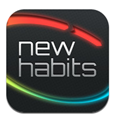
- Provide extra support to early adopters
- Be authentic, likeable & appreciative
- Master the five factors of innovation diffusion
- Leverage opinion leaders and indirect influence.
I’ve documented the 25 best practices as knowledge cards in the NewHabits, a free iPhone and iPad App. You play a card daily to experiment with and eventually master a proven influence technique. Cards are designed to fit into your everyday routine and take minutes to use. Each card is a small-step learning experience that accumulates over time into the habits of highly effective influencers.
An example card and table of contents for the deck is shown below.
Categories: Books, Mental Focus, Problem Solving, Software Tags:
Improve Problem Solving Under Pressure
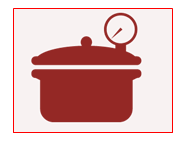 Interesting new research from Carnegie Mellon University demonstrates that chronically stressed individuals get better at problem solving if they take a few minutes to think about what is important to them. This self-affirmation technique can involve something as simple as taking a few minutes to identify an important value (family, art, business, friends. etc.) and writing a couple of sentences on what makes it important.
Interesting new research from Carnegie Mellon University demonstrates that chronically stressed individuals get better at problem solving if they take a few minutes to think about what is important to them. This self-affirmation technique can involve something as simple as taking a few minutes to identify an important value (family, art, business, friends. etc.) and writing a couple of sentences on what makes it important.
Focusing on what is important mitigates the effects of stress on parts of your brain and immediately improves your ability to solve problems. There is some evidence that this works outside the laboratory:
“An emerging set of published studies suggest that a brief self-affirmation activity at the beginning of a school term can boost academic grade-point averages in underperforming kids at the end of the semester.
A simple technique for improving cognitive performance under pressure in yourself and others. I am interested to hear from readers that have built self-affirmation into everyday activities.
Source of image: Pressure Cooker
Categories: College Student, Problem Solving Tags:
Can We Get Better at Learning From Experience?
We learn most things from experience. Learning how to ride a bike, solve algebraic equations, cook a good meal, read a book or get along with a difficult neighbor are just a few examples. The learning from experience process is well understood. It is conceptually simple but error prone in practice.
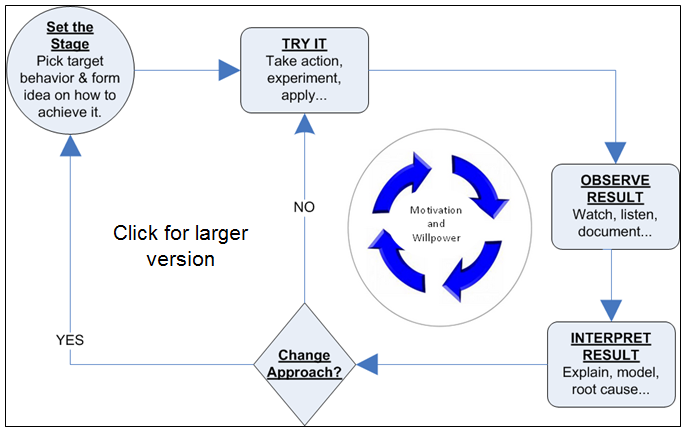 We set the stage by deciding what we are trying to learn and selecting a new behavior to try. We try the new behavior, observe the results, interpret the results and decide if we need to change our approach or stay the course. This process is repeated until we reach our goal or give up.
We set the stage by deciding what we are trying to learn and selecting a new behavior to try. We try the new behavior, observe the results, interpret the results and decide if we need to change our approach or stay the course. This process is repeated until we reach our goal or give up.
Of course it takes motivation to get this effort started and willpower to keep it going. Learning something new from experience takes diligence and usually involves some physical, emotional or reputational risks. Remember falling off your bike and the worry of reading poorly out loud as a grade school student?
Given the fundamental role learning from experience plays in acquiring new skills and changing behaviors, getting better at would have a significant impact on our overall cognitive performance. But can we really get better at it?
Fortunately, the answer is yes but we need to approach it one-step at a time. We should focus on improving our observation skills, interpretation skills or our capacity for self-control. Improvement in any one of these areas should translate into faster and deeper learning from experience.
You can use NewHabits, the free iPhone and iPad App to improve your ability to learn from experience. The App includes the following decks of knowledge cards:
Each deck includes 25 proven practices for getting better at one of the steps in learning from experience. You can play a card daily or every few days from your mobile device. Cards are designed to fit into your daily work or home routine and takes just  minutes to play. Each card is one small improvement step but the effects accumulate over time into significant new competencies and habits.
minutes to play. Each card is one small improvement step but the effects accumulate over time into significant new competencies and habits.
Download NewHabits and give some cards a try. Both the motivation and observation decks are free. The other decks are $0.99 or $1.99 but you get 3 sample cards for free.
Categories: Cognitive Development, Problem Solving, Software Tags: experiential learning
Train Your Creative Brain in Minutes a Day
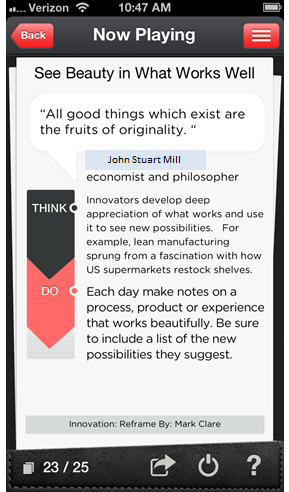 I recently completed a review of some of the best creativity techniques and innovation methods. My goal was to distill proven practices for improving creativity into a set of knowledge cards that could be used for brain training. Unlike most approaches to brain training, I did not want to create a game or some structured task to do on a computer. I wanted brain training “in the wild” or something that you can do along with your everyday activities and work efforts. That way you will see improvements in areas that matter. The result is a mobile brain training solution that runs on the iPhone, iPad and iPod touch:
I recently completed a review of some of the best creativity techniques and innovation methods. My goal was to distill proven practices for improving creativity into a set of knowledge cards that could be used for brain training. Unlike most approaches to brain training, I did not want to create a game or some structured task to do on a computer. I wanted brain training “in the wild” or something that you can do along with your everyday activities and work efforts. That way you will see improvements in areas that matter. The result is a mobile brain training solution that runs on the iPhone, iPad and iPod touch:
You can access the Reframe cards through NewHabits a free App that includes others decks on innovation and behavior change.
Play a card daily from your mobile device to experiment with and eventually master a proven creativity technique. Cards are designed to fit into everyday routines and take minutes to use. The Reframe cards work by converting general advice and complex how-to knowledge about creativity into right-sized chunks that are optimized for how we learn from experience.
The Reframe deck includes 25 cards. An example is shown to the right. Many of the cards assume you are working on a hard problem or innovation challenge that requires creativity. If you don’t have one pick a challenge from around the house – how to get the kids to do their homework or how to pick a wow gift for your spouse – and use that.
The deck includes a table of contents that makes it easy to manage and navigated the cards. You can share cards for free with friends via email, text messages, Twitter, Facebook and other means. For more information on how the App works check out the screen walk through.
Give the App a try and please comment on your experiences.
Categories: Problem Solving, Software, Training Tags:
Purpose Boosts Mental Performance & Brain Health
Studies at the Rush University Medical Center involving over 1000 subjects:
“…showed that people who reported greater purpose in life exhibited better cognition than those with less purpose in life even as plaques and tangles accumulated in their brains,” said Patricia A. Boyle, PhD.”
This is great news for anyone interested in improving cognitive performance or maintaining brain health as they age.
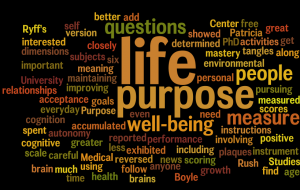 Purpose in life is determined by the meaning you get from everyday activities and how much of your time is spent pursuing goals that are important to you. It can be measured using Ryff’s well-being scale . The instrument measures well-being along six dimensions including autonomy, environmental mastery, personal growth, self acceptance, positive relationships with others and purpose in life. The questions that measure purpose in life are: 5,11,17,23,29,35 and 41. Be careful to follow the scoring instructions closely as the scores for some of the questions need to be reversed before you add them up.
Purpose in life is determined by the meaning you get from everyday activities and how much of your time is spent pursuing goals that are important to you. It can be measured using Ryff’s well-being scale . The instrument measures well-being along six dimensions including autonomy, environmental mastery, personal growth, self acceptance, positive relationships with others and purpose in life. The questions that measure purpose in life are: 5,11,17,23,29,35 and 41. Be careful to follow the scoring instructions closely as the scores for some of the questions need to be reversed before you add them up.
Categories: Cognitive Decline, Memory and Learning, Older Adult, Other, Problem Solving Tags:
50% Improvement in Creativity in 4 Days
 A recent study reported by the University of Utah demonstrated a significant improvement in creativity in a group of subjects that completed a 4-day nature hike. Importantly, the hikers did not have access to electronic devices such as phones or computers. It is not clear exactly what caused the boost in creativity – physical exercise, exposure to nature, unplugged from technology, disruption in routine, other factors or a combination of factors but the effect was clear:
A recent study reported by the University of Utah demonstrated a significant improvement in creativity in a group of subjects that completed a 4-day nature hike. Importantly, the hikers did not have access to electronic devices such as phones or computers. It is not clear exactly what caused the boost in creativity – physical exercise, exposure to nature, unplugged from technology, disruption in routine, other factors or a combination of factors but the effect was clear:
“We show that four days of immersion in nature, and the corresponding disconnection from multimedia and technology, increases performance on a creativity, problem-solving task by a full 50 percent,”
The researchers used the Random Association Test to measure creativity. This is a 10-question test where each question presents three words and your job is to come up with a fourth that relates them. For example, the series Falling, Actor, Dust is tied together by the word Star. Or you need to come up with the word Candle to relate the three-word series Stick, Light, Birthday. For some samples to try yourself go HERE. Don’t look at the second page until your done. It is the key.
Interested to hear from readers that spend time in nature or intentionally unplug from TV, phones and other gadgets as a way to improve cognitive performance.
Source of Image: Valley of the Gods
Categories: Problem Solving Tags: creativity
Exercise Boosts Brain In Proportion to Effort Made
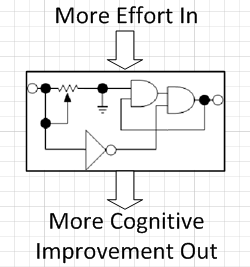 We have reported many times in the Next Brain Blog on scientific studies that suggest exercise improves brain function and cognitive performance. Now a new study led by the director of the Montreal Heart Institute suggests that the more exercise you do the more cognitive improvement you see. The study focused on overweight and inactive adults that were 49 years old on average. A summary of the results:
We have reported many times in the Next Brain Blog on scientific studies that suggest exercise improves brain function and cognitive performance. Now a new study led by the director of the Montreal Heart Institute suggests that the more exercise you do the more cognitive improvement you see. The study focused on overweight and inactive adults that were 49 years old on average. A summary of the results:
“After four months of high-intensity interval training, heart patients in Juneau’s study had markedly improved cognitive functions: the ability to think, recall, and make quick decisions. Even more exciting is that the study demonstrated that the more exercise patients could tolerate, the better their results—their minds became “sharper.”
While there is surely some limit to this effect, it does suggest that increasing the duration/intensity of your workout could lead to an increased brain boost.
Categories: Memory and Learning, Older Adult, Problem Solving, Training Tags:

